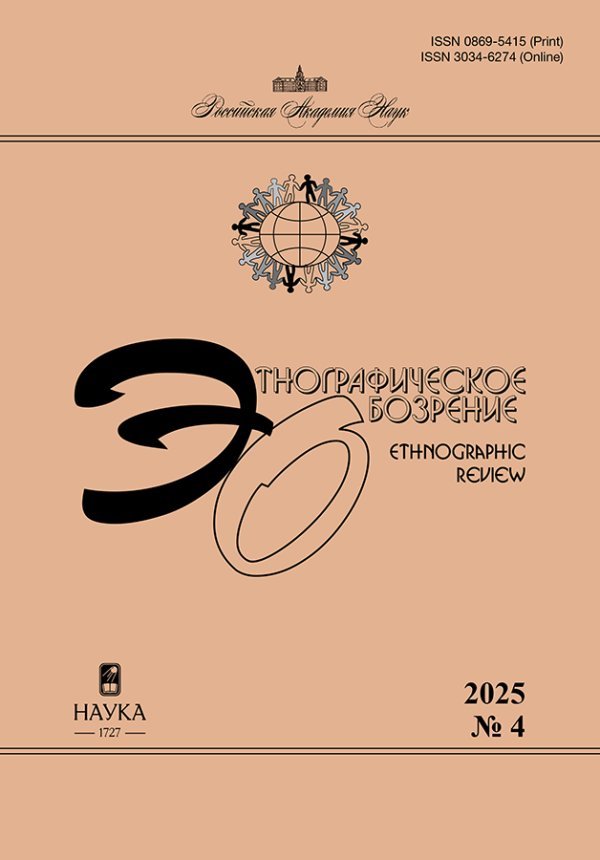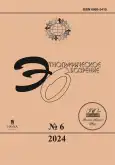Family Business Governance: The Enterprise as a Household
- Authors: Tereshina D.V.1
-
Affiliations:
- Higher School of Economics – Saint Petersburg Branch
- Issue: No 6 (2024)
- Pages: 66-80
- Section: Special Theme of the Issue: Economic Anthropology of Household Outside Metropolitan Areas in Contemporary Russia
- URL: https://gynecology.orscience.ru/0869-5415/article/view/672373
- DOI: https://doi.org/10.31857/S0869541524060046
- EDN: https://elibrary.ru/VTTIAK
- ID: 672373
Cite item
Abstract
The article examines family governance among small businesses drawing on the ethnography of entrepreneurs and business families in a Russian town. The study of informal mechanisms of family governance allows us to understand how the subjects of management and control legitimize the existing division of labor in the enterprise and what social and cultural meanings stand behind such a distinction. The study demonstrates that enterprises where a married couple is involved in management, control and ownership are built on the principles of household management, in which the division of labor between spouses often recreates the desired gender order such that the ideology of successful masculinity and a “feeling of being an owner” coexist with the ideals of successful motherhood and familism.
Full Text
About the authors
Daria V. Tereshina
Higher School of Economics – Saint Petersburg Branch
Author for correspondence.
Email: dtereshina@gmail.com
ORCID iD: 0000-0001-9985-9373
PhD, научный сотрудник
Russian Federation, Saint PetersburgReferences
- Ashwin, S., and T. Lytkina. 2004. Men in Crisis in Russia: The Role of Domestic Marginalization. Gender & Society 18 (2): 189–206.
- Astrachan, J.H., and M.C. Shanker. 2003. Family Businesses’ Contribution to the US Economy: A Closer Look. Family Business Review 16 (3): 211–219.
- Bear, L., K. Ho, A. Tsing, and S. Yanagisako. 2015. Gens: A Feminist Manifesto for the Study of Capitalism. http://www.culanth.org/fieldsights/652-gens-a-feminist-manifesto-for-the-study-of-capitalism
- Burawoy, M., and K. Verdery. 1999. Uncertain Transition: Ethnographies of Change in the Postsocialist World. Oxford: Rowman & Littlefield.
- Carsten, J., ed. 2000. Cultures of Relatedness: New Approaches to the Study of Kinship. Cambridge: Cambridge University Press.
- Chepurenko, A. 2018. Small Family Business in Russia: Formal or Informal? International Journal of Sociology and Social Policy 38 (9/10): 809–822.
- Cherkaev, X. 2023. Gleaning for Communism: The Soviet Socialist Household in Theory and Practice. Ithaca: Cornell University Press.
- Chernova, J. 2012. Balans sem’i i raboty: politika i individual’nye strategii materei [Work-Family Balance: Policies and Individual Strategies of Mothers]. Zhurnal issledovanii sotsial’noi politiki 10 (3): 295–308.
- Chrisman, J.J., J.H. Chua, and P. Sharma. 2005. Trends and Directions in the Development of a Strategic Management Theory of the Family Firm. Entrepreneurship Theory and Practice 29 (5): 555–575.
- Faccio, M., and L. Lang. 2002. The Ultimate Ownership of Western European Corporations. Journal of Financial Economics 65: 365–395.
- Ferguson, J. 2006. Global Shadows: Africa in the Neoliberal World Order. Durham: Duke University Press.
- Foucault, M. 2007. Security, Territory, Population: Lectures at the Collège de France, 1977–78. New York: Picador.
- Friedman, R. 2020. Modernity, Domesticity and Temporality in Russia: Time at Home. London: Bloomsbury Academic.
- Holt, R., and A. Popp. 2013. Emotion, Succession, and the Family Firm: Josiah Wedgwood & Sons. Business History 55 (6): 892–909.
- Howell, S. 2003. Kinning: The Creation of Life Trajectories in Transnational Adoptive Families. Royal Anthropological Institute 9: 465–484.
- Humphrey, C. 2002. The Unmaking of Soviet Life: Everyday Economies After Socialism. Ithaca: Cornell University Press.
- Jaskiewicz, P., J.G. Combs, and S.B. Rau. 2015. Entrepreneurial Legacy: Toward a Theory of How Some Family Firms Nurture Transgenerational Entrepreneurship. Journal of Business Venturing 30 (1): 29–49.
- Jurczyk, K., ed. 2020. Doing Und Undoing Family: Theoretische Und Empirische Entwicklungen [Doing and Undoing Family: Theoretical and Empirical Developments]. Weinheim: Beltz Juventa.
- Kiblitskaya, M. 2000. Russia’s Female Breadwinners: The Changing Subjective Experience. In Gender, State and Society in Soviet and Post-Soviet Russia, edited by S. Ashwin, 55–70. London: Routledge.
- Koellner, T. 2022. Family Firms and Business Families: A Field for Anthropological Research. Anthropology Today 38 (6): 8–10.
- Ledeneva, A. 2013. How Russia Really Works: The Informal Practices That Shaped Post-Soviet Politics and Business. Ithaca: Cornell University Press.
- Ledeneva, A. 2017. The Ambivalence of Favour: Paradoxes of Russia’s Economy of Favours. In Economies of Favour after Socialism, edited by D. Henig and N. Makovicky, 21–49. Oxford: Oxford University Press.
- Meshcherkina, E. 2000. New Russian Men: Masculinity Regained? In Gender, State and Society in Soviet and Post-Soviet Russia, edited by S. Ashwin, 105–117. London: Routledge.
- Muehlebach, A., and N. Shoshan. 2012. Introduction. Anthropological Quarterly 85 (2): 317–343.
- Mustakallio, M., E. Autio, and S.A. Zahra. 2002. Relational and Contractual Governance in Family Firms: Effects on Strategic Decision Making. Family Business Review 15 (3): 205–222.
- Narotzky, S. 2015. The Payoff of Love and the Traffic of Favours. In Flexible Capitalism: Exchange and Ambiguity at Work, edited by J. Kjaerulff, 173–206. New York: Berghahn.
- Rogers, D. 2009. The Old Faith and the Russian Land: A Historical Ethnography of Ethnography of Ethics in the Urals. Ithaca: Cornell University Press.
- Rotkirch, A. 2000. The Man Question: Loves and Lives in Late 20th Century Russia. Helsinki: University of Helsinki.
- Sahlins, M. 2013. What Kinship Is – And Is Not. Chicago: University of Chicago Press.
- Salmenniemi, S., P. Karhunen, and R. Kosonen. 2011. Between Business and Byt: Experiences of Women Entrepreneurs in Contemporary Russia. Europe-Asia Studies 63 (1): 77–98.
- Schimpfössl, E. 2018. Rich Russians: From Oligarchs to Bourgeoisie. Oxford: Oxford University Press.
- Shevchenko, O. 2008. Crisis and the Everyday in Postsocialist Moscow. Bloomington: Indiana University Press.
- Tereshina, D. 2023. Business as a Gift: Family Entrepreneurship and the Ambiguities of Sharing. In Family Firms and Business Families in Cross-Cultural Perspective: Bringing Anthropology Back, edited by T. Koellner, 115–146. Cham: Palgrave Macmillan.
- Utrata, J. 2008. Babushki as Surrogate Wives: How Single Mothers and Grandmothers Negotiate the Division of Labor in Russia. UC Berkeley: Berkeley Program in Soviet and Post-Soviet Studies. https://escholarship.org/uc/item/3b18d2p8
- Utrata, J. 2015. Women without Men: Single Mothers and Family Change in the New Russia. Ithaca: Cornell University Press.
- Yanagisako, S. 2002. Producing Culture and Capital: Family Firms in Italy. Princeton: Princeton University Press.
- Yanagisako, S. 2019. Family Firms as Kinship Enterprises. Economics Discussion Papers 2019-12, Kiel Institute for the World Economy. http://www.economics-ejournal.org/economics/discussionpapers/2019-12
- Yurchak, A. 2003. Russian Neoliberal: The Entrepreneurial Ethic and the Spirit of “True Careerism”. The Russian Review 62 (1): 72–90.
- Yusufov, R. 2015. Russia’s Wealth Possessors Study 2015. SSRN (April 3, 2015). http://dx.doi.org/10.2139/ssrn.2837773
- Zellweger, T., K. Eddleston, and F. Kellermanns. 2010. Exploring the Concept of Familiness: Introducing Family Firm Identity. Journal of Family Business Strategy 1 (1): 54–63.
Supplementary files








